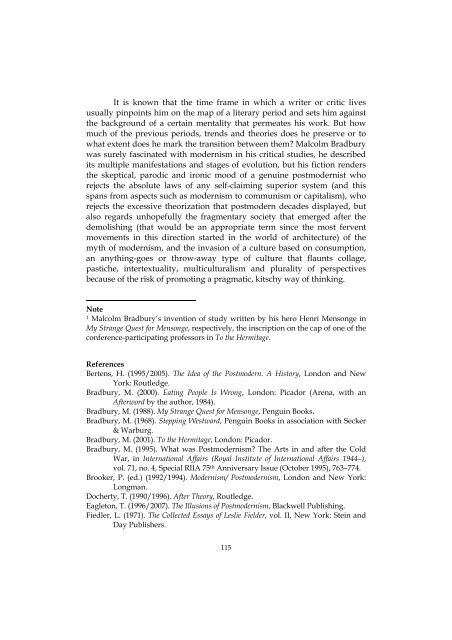translation studies. retrospective and prospective views
translation studies. retrospective and prospective views
translation studies. retrospective and prospective views
Create successful ePaper yourself
Turn your PDF publications into a flip-book with our unique Google optimized e-Paper software.
It is known that the time frame in which a writer or critic lives<br />
usually pinpoints him on the map of a literary period <strong>and</strong> sets him against<br />
the background of a certain mentality that permeates his work. But how<br />
much of the previous periods, trends <strong>and</strong> theories does he preserve or to<br />
what extent does he mark the transition between them? Malcolm Bradbury<br />
was surely fascinated with modernism in his critical <strong>studies</strong>, he described<br />
its multiple manifestations <strong>and</strong> stages of evolution, but his fiction renders<br />
the skeptical, parodic <strong>and</strong> ironic mood of a genuine postmodernist who<br />
rejects the absolute laws of any self-claiming superior system (<strong>and</strong> this<br />
spans from aspects such as modernism to communism or capitalism), who<br />
rejects the excessive theorization that postmodern decades displayed, but<br />
also regards unhopefully the fragmentary society that emerged after the<br />
demolishing (that would be an appropriate term since the most fervent<br />
movements in this direction started in the world of architecture) of the<br />
myth of modernism, <strong>and</strong> the invasion of a culture based on consumption,<br />
an anything-goes or throw-away type of culture that flaunts collage,<br />
pastiche, intertextuality, multiculturalism <strong>and</strong> plurality of perspectives<br />
because of the risk of promoting a pragmatic, kitschy way of thinking.<br />
Note<br />
1 Malcolm Bradbury’s invention of study written by his hero Henri Mensonge in<br />
My Strange Quest for Mensonge, respectively, the inscription on the cap of one of the<br />
conference-participating professors in To the Hermitage.<br />
References<br />
Bertens, H. (1995/2005). The Idea of the Postmodern. A History, London <strong>and</strong> New<br />
York: Routledge.<br />
Bradbury, M. (2000). Eating People Is Wrong, London: Picador (Arena, with an<br />
Afterword by the author, 1984).<br />
Bradbury, M. (1988). My Strange Quest for Mensonge, Penguin Books.<br />
Bradbury, M. (1968). Stepping Westward, Penguin Books in association with Secker<br />
& Warburg.<br />
Bradbury, M. (2001). To the Hermitage, London: Picador.<br />
Bradbury, M. (1995). What was Postmodernism? The Arts in <strong>and</strong> after the Cold<br />
War, in International Affairs (Royal Institute of International Affairs 1944–),<br />
vol. 71, no. 4, Special RIIA 75 th Anniversary Issue (October 1995), 763–774.<br />
Brooker, P. (ed.) (1992/1994). Modernism/ Postmodernism, London <strong>and</strong> New York:<br />
Longman.<br />
Docherty, T. (1990/1996). After Theory, Routledge.<br />
Eagleton, T. (1996/2007). The Illusions of Postmodernism, Blackwell Publishing.<br />
Fiedler, L. (1971). The Collected Essays of Leslie Fielder, vol. II, New York: Stein <strong>and</strong><br />
Day Publishers.<br />
115












